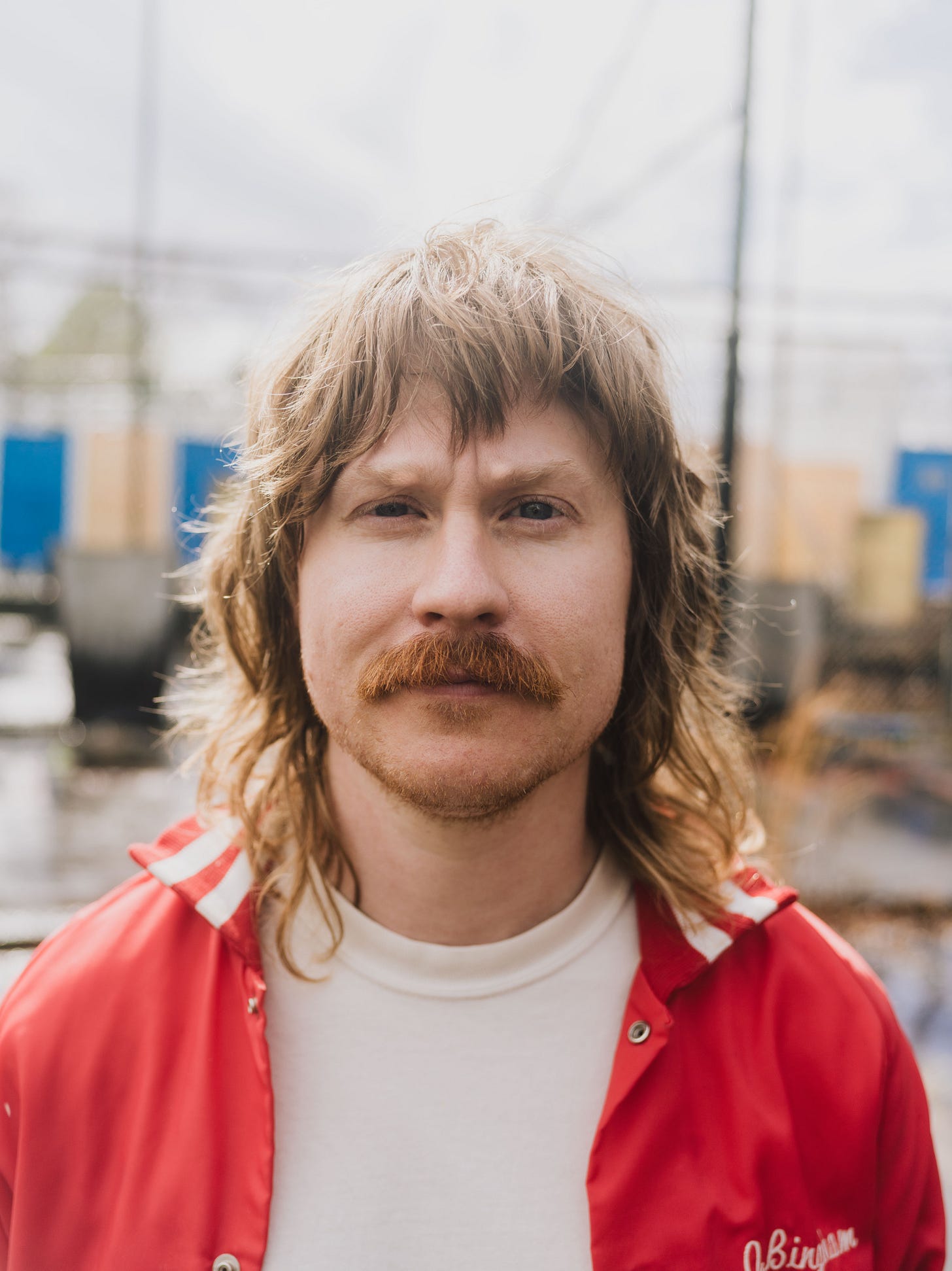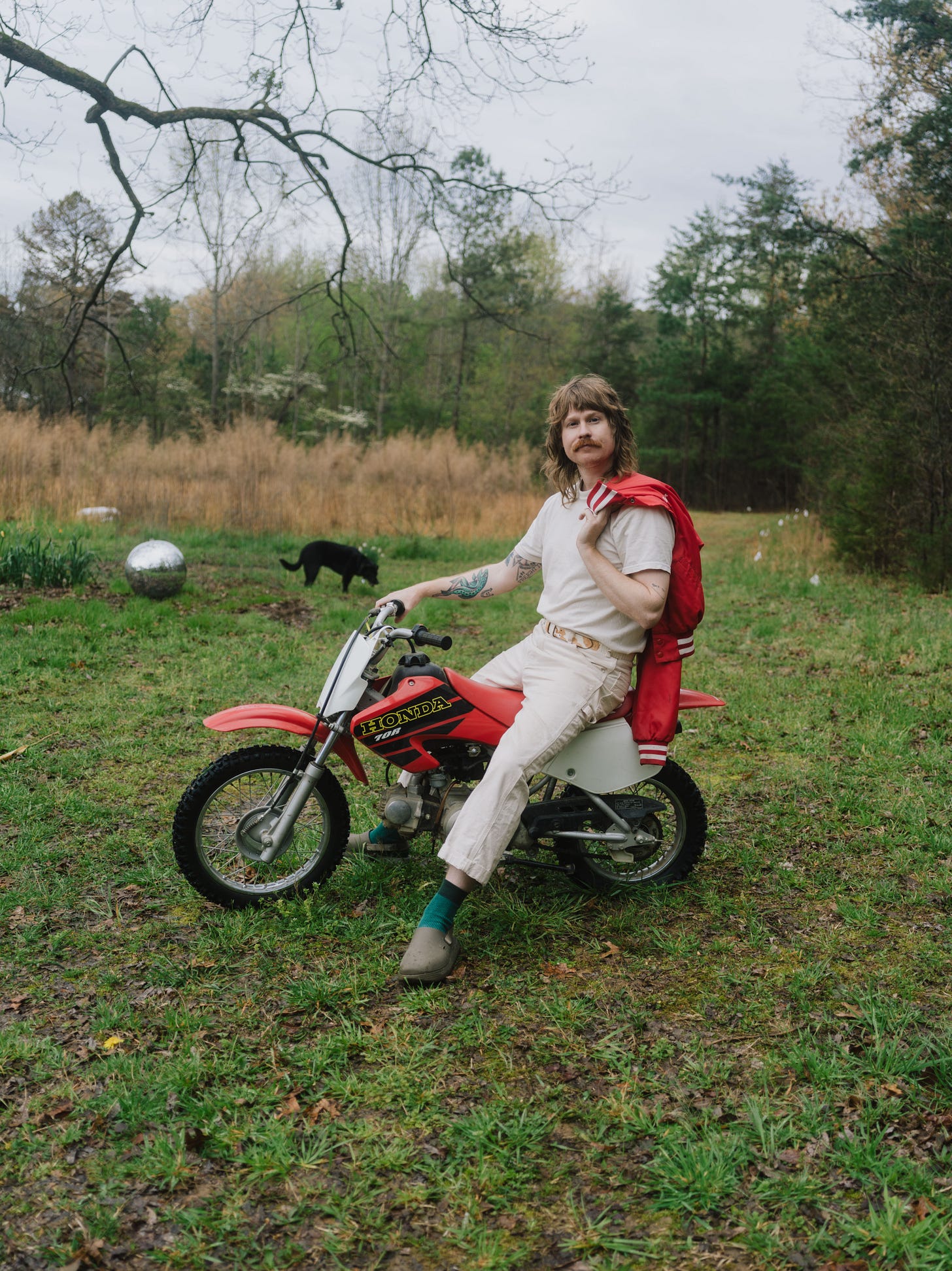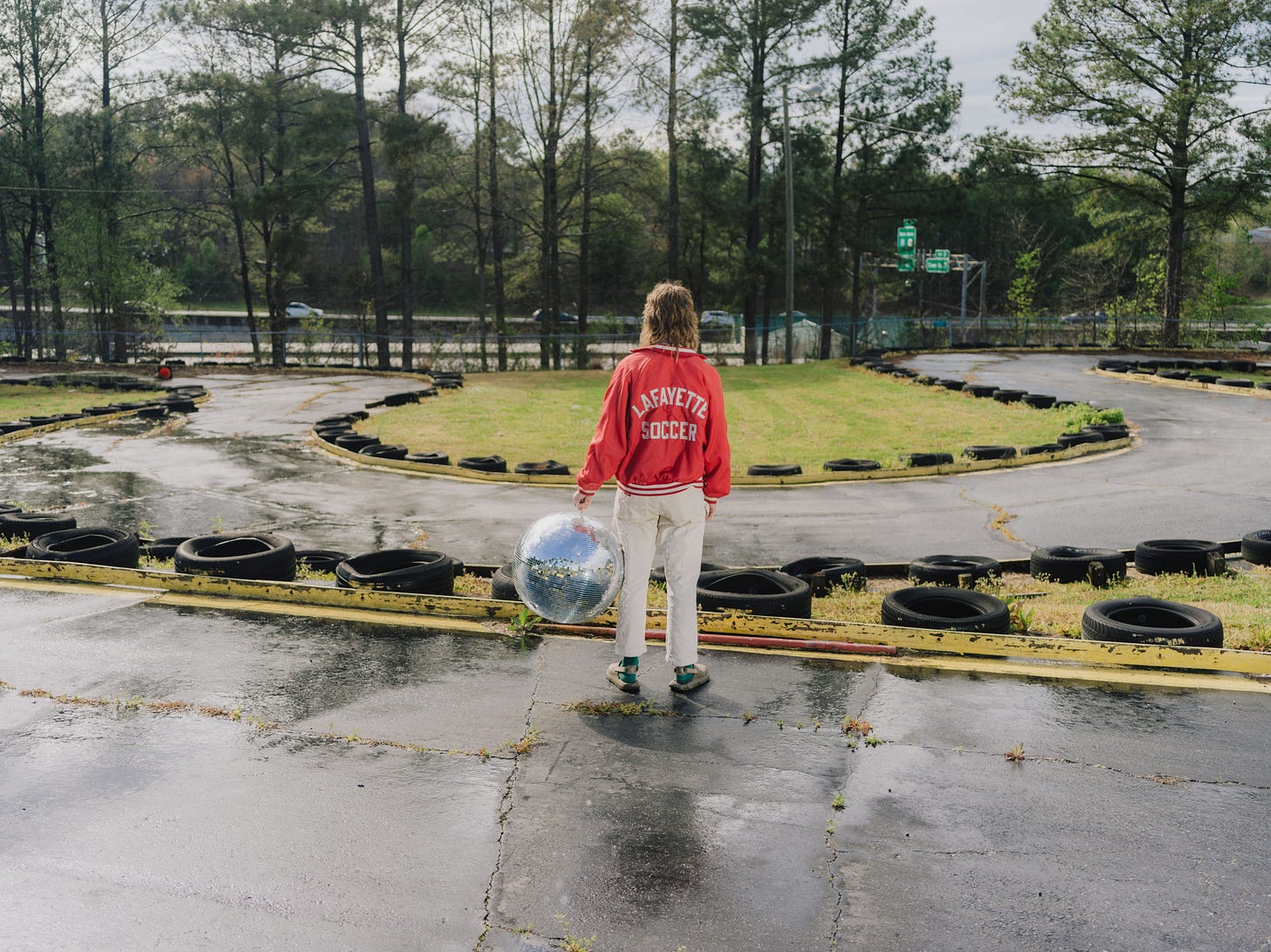#52: Disco, Digiorno, and Good Grief
An Interview with Alex Bingham (Magic AL)
Earlier this fall, I called up a childhood friend to talk about grief, as one does. Alex Bingham was taking a break from touring with the band Hiss Golden Messenger to officiate a wedding in the mountains of North Carolina, and I imagined the landscape like the one we grew up in, mountains and valleys and mountains and valleys. From car bluetooth to car bluetooth we talked about the past, friendship, dancing, music, snacks, and home, and I was transported a bit.
Bingham, who makes music under the name “Magic AL” was about to release his debut solo record which came out this fall to a lot of love from New Commute, Northern Transmissions, and KEXP. The album title “Good Grief” has an easy double entendre: on one hand there is the sweet and lovable, Charlie Brown, eye-roll version of “good grief”, but also the serious idea that grief is positive and something necessary to work through. (The record came together in just a few short months following the deaths of several people close to him, including his best friend John.)
The album cover by artist Nathaniel Russell is playful and tender, just like the record, which features a host of musicians Alex frequently collaborates with: Libby Rodenbough and Joseph Terrell of Mipso, Rosali, Molly Sarlé, and Amelia Meath of Sylvan Esso to name just a few. My favorite track is the jangly and lilting “Hello” with Viv & Riley and Sumbuck. It’s somber yet groovy, packed full of love and the hopeful feeling of leaning into joy and connection over sadness and solitude.
Alex talks about how the record came to be during a season of immense grief, when making music with friends and collaborators carried him. Posted up in Bedtown Studios on Smith Mountain Lake where Alex is typically behind the scenes as a producer, we talk about what it was like to build a sound of his own. I ask about what they ate (Digiorno), what they drank (tiny Coca Colas from the outdoor fridge), and what good grief means to him. I hope you enjoy our conversation. It has been edited and condensed for clarity.
CJ: Something that strikes me about the sound of the record so far is that it’s yours, but it’s also highly collaborative. You are a touring musician, but also a producer, and an artist making space for all of those things. What was it like to work with so many friends and collaborators in such a short span of time?
AB: That was very new. It took some adjusting. I was still the producer, but we were producing something for me. Everyone on this record is close to me and knew what I was going through and was a part of my support group or grieving. Sometimes I would send people an idea for a song and someone like Libby, who's an incredible songwriter—always has a few songs in the back of her pocket—and we’d finish them together. This is a celebration of my friends for my friends. I get the most joy out of making music with other people. That's why I do music. I don't like producing alone as much. Sometimes I need to do it to have some space and do some learning and make a bunch of mistakes and whatnot. But at the end of the day, I'm just filling my tank, which is making music with other people whether it's in a band or in the studio.
CJ: What do you remember about what you ate, what you drank, in the time you had together? What fueled this record?
AB: I love that question. You have a lot of shit, maybe a meal or two that will make you laugh or that you've done in the past. Libby [Rodenbough] and I, we always have DiGiorno Croissant Crust pizza. Libby is a really good cook. Both of us could make a very nice meal, but we were watching Adam Sandler movies and decided to watch Adam Sandler movies and make Croissant Crust pizza, which is a very particular vibe.
I was very into cooking with the duo Vivian and Riley. We had made a record up at the Lake House and [I knew] they were excellent cooks—by far the most healthy and nourishing and flavorful meals I've had up there. They’d whip up amazing vegetarian meals. We threw down cooking some stews with farro and some chickpea dishes. It was bowls of grains and greens and things that were so flavorful—theirs ended up being some of the best food I had up there.
It was also a lot of bubbly water. Sometimes we'd have a cocktail at like five o'clock. Me and Chris [Frisina], we found some miniature Cokes in the outdoor fridge and we both had one. We were like, “Yeah, we'll just have a little mini Coke… wow, it's pretty good…” It creeps in and you realize you're having a small mini Coke once a day and then twice a day. All of the sudden you realize you're just drinking Coke every day. The Coke is self-care and then it's like, I'm a part-time soda drinker now.
CJ: I wanted to ask about your memories of making music as a child and growing up. What do you remember?
AB: My first memory of music as a kid was seeing my grandma who had never studied music in any real capacity sit down at the piano and just improvise. It was very musical. She had this baby grand piano in her house. It was a weird 90s country house with a big wooden room with super tall ceilings. We’d call it the gymnasium. Her playing the piano in that room and me sitting on the bench and her showing me how to explore around the keyboard was the first time I was more than curious. She was always letting me take fists and bang around on the piano trying to find melodies that I knew, Christmas songs and things.
I feel like my entire life I've been sifting through these different avenues of getting to where I'm supposed to be in music. It took going through Youth Symphony because that's what was available, and I had a lot available. I was very privileged to have an orchestra in middle school. But even in those moments I remember our substitute teacher—which is hilarious that a normal substitute would be called in to teach an orchestra class, like, what are they going to do?—ask a bunch of questions and try to conduct. I remember it being really funny. They were like, “Well, who wants to actually be a musician?” I raised my hand and I remember someone being like, “Shut up, Alex, no you fucking don't.” But I really did, and I knew from that moment that it would be a big part of my life.
CJ: I think I read in another interview somewhere that you played samples at parties just to see what people were getting down to.
AB: Yeah. There's a golden era of producers working DJ sets at roller rinks where they’d put disco or house tracks on to see how they flow in a setting like that. As funny as it sounds—the trope of becoming a DJ in your 30s—I think it's a really important part of making dance music: understanding how things work in context.
During the pandemic, I quarantined with my friend Chris Frisina, who goes by the artist name Lou Hazel. He’s now one of my best friends, but we were just getting to know each other, and I had talked about wanting to make some dance music. He's such a prolific writer that he had something in his back pocket that might work. He was noodling it on the keyboard, and I was like, all right, we're doing that right now. Within a couple hours, the full message and body of that song was done. We were sitting on that through the whole pandemic, and then I was [DJing] at a farm party, a big bonfire. I had moved the tractor out to next to the bonfire and with the front end loader I lifted up a disco ball that my mom gave me for Christmas all these years ago, a giant 20-inch disco ball, one of my prized possessions. I got the headlights from the tractor reflecting, and I slipped [“Party for One”] on at the dance party.
As funny as it sounds—the trope of becoming a DJ in your 30s—I think it's a really important part of making dance music: understanding how things work in context.
It’s really nerve-wracking because you care so much. I thought it was good, but you just never know. It could be that people aren't really listening or don’t want to dance anymore, but it was so sweet because as soon as we put that [track] on this couple grabbed hands and moved closer to the disco ball and started dancing like they were at prom, which was the best reaction I could have gotten. It was the biggest thumbs up. They also came up to the booth and were like, What song is this? Which is the best compliment. That was enough encouragement in my back pocket for a rainy day, whenever I needed to find some kind of mojo to keep going while making the record. It was one of the only songs on the record, Good Grief, that was the guiding light.
CJ: Tell me a little bit more about “Good Grief” and what that means for you?
AB: You think about what you would do if you found out your best friend was dying versus what you actually do. Finding the way to match those two up—or not—because some of the things you thought you would do are not real, like making time for your expectations and making time for your values. I was really nervous that I didn't have the values that I thought I did, because I wasn't seeing John as much as I wanted to, or thought I would want to. But really I was just too busy, and I needed to do the adult thing of scheduling time to go hang out with my friend who was dying.
You know, if you asked me five years ago, I would drop everything and move into his house, but that's not what he would want either. Making time, learning how to make time for my values, and making time for this record was a big, big thing. And that's a really beautiful, really profound, idea. This idea that it was an act of love towards my friend to do what I needed to do, as well as make space for them intentionally.
Making time, learning how to make time for my values, and making time for this record was a big, big thing. And that's a really beautiful, really profound, idea. This idea that it was an act of love towards my friend to do what I needed to do, as well as make space for them intentionally.
One of my biggest worries when John was declining was that I wouldn't be able to communicate everything I wanted to him and be able to talk to him about all the hard things. I was always that friend in the group: first one to cry, first one to bring up maybe a harder conversation. Time was limited, and I finally got the chance to ask some harder questions, and his answers were really profound. [After that] I got back to the house I found, almost by accident, a different song for the record. I was constantly looking for samples. I love an instrumental track because it's easier to sample, and then while searching through, I found a sample that was so meaningful. I remember making this 90s boom-bap hip hop beat and crying in my studio because of this deep meaning that, to only me, would resonate. I just kept having moments like that in my production practice, myself in the studio, processing. I put all of these techniques and lessons that I learned both emotionally and musically into my production of this record.
Thank you, Alex!
Photos by Graham Tolbert
Good reads
Zenith Cooperative, a group of journalists with a mission to find a sustainable alternative to the labor conditions of modern media, has opened up their Mentorship Application for both mentors and mentees “whose perspectives have not always been prioritized or highlighted in the mainstream media and people on the margins who are looking to maneuver the messy messy media industry.” It is open until February 11th at 11:59pm.
I’d much too often forget to read Melissa Kirsch’s Saturday newsletter if it weren’t for my mom or best friend, who lovingly ping me the best clips. They’re the real ones. This past Saturday’s was about the delights of micro-mapping and taking a little walk in your backyard.
‘It matters not where or how far you travel — the farther commonly the worse — but how much alive you are.’
KJ Kearney (@blackfoodfridays) shares the story of Georgia Gilmore and how she organized “The Club from Nowhere” a collective of anonymous women who made home cooked meals and sold baked goods literally fueling and funding the 381 day Montgomery Bus Boycott. When we talk about how there’s a place for everyone in the movement, Gilmore’s is a model for how donating or selling food can be a political act.
Call Me Palestinian, Jaya Saxena for Eater
Naming Palestine is also a matter of adding specificity, or engaging with one’s identity in a public way. Mona Leena, chef and owner of Lulu on Solano in Berkeley, California, has labeled her cooking “California Palestinian,” a celebration of similarities she’s found between the Palestinian cooking she grew up with and other techniques she learned in professional kitchens. For Moureen Kaki, cooking Palestinian food at her pop-up, often with the Texan influence of offset smoke, was a way for her to set her own terms. ‘I just wanted a way I could engage with it that people couldn’t deny. Food is an easy way to do that, because either you eat the food. and shut up, or you don’t come.





